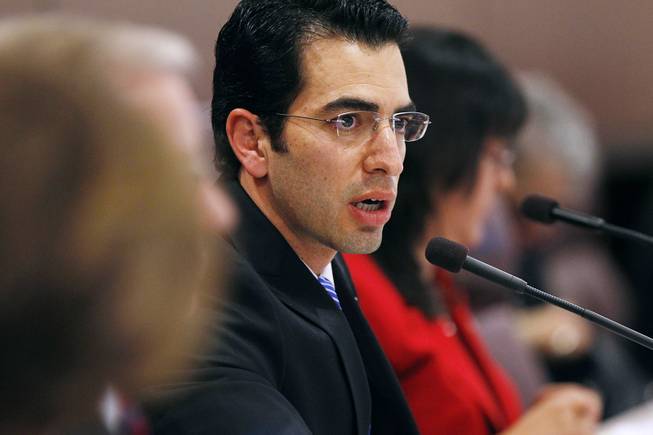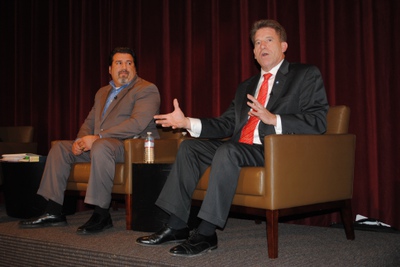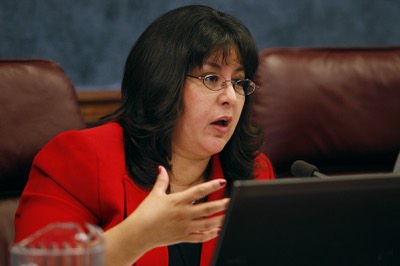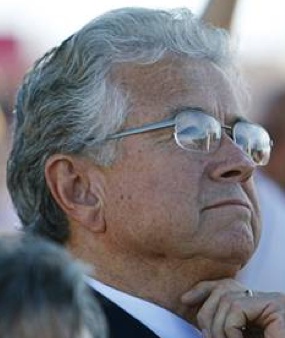
Sam Morris / Las Vegas Sun
State Sen. Ruben Kihuen takes part in a meeting of the Taxation Committee on the second day of the 2013 legislative session Tuesday, Feb. 5, 2013, in Carson City.
Sunday, Feb. 17, 2013 | 2 a.m.
Sun Archives
More than 125 years ago, after the 1874 elections, Pablo Laveaga became the first Hispanic elected to the Nevada Legislature, representing Humboldt County.
The next Hispanic legislator in Nevada came 70 years later. The third was not elected until another 38 years had passed.
Recently, however, thanks to changes in the state’s demographics and opportunities that have come from tweaks in the state electoral system, Hispanics have been getting elected at a much faster pace.
In 2010 six freshman Hispanic politicians were elected to the Nevada Assembly, making eight total in the Legislature. This year, Mo Denis, first elected to the Assembly in 2004, became the first Hispanic majority leader of the Nevada Senate. The governor and attorney general are both Hispanic.
Still, Hispanic politicians and community leaders say there is much more to be accomplished. There are no Hispanic members on the North Las Vegas City Council, Clark County Commission, the Clark County School District Board of Trustees or Henderson City Council. No Hispanic has ever been elected to the U.S. House of Representatives or Senate from Nevada.
Yet, thanks to a crop of dynamic and ambitious Hispanic community leaders, and an increasingly engaged Hispanic electorate, there is hope the momentum gained in the last decade will not fade.
The perspectives of a champion of civic engagement, a political analyst and an elected rising star show a consensus: Hispanics are influencing Nevada and national politics like never before, but they cannot let the current momentum slip away.
Promoting political participation
Fernando Romero has led Hispanics in Politics, the oldest Hispanic political organization in Las Vegas, for the better part of 15 years.
The nonpartisan group initially started as a wing of the Las Vegas Latin Chamber of Commerce in 1982, but it became its own entity in 1995. In 2012 a parade of candidates came through the organization’s regular breakfast meetings, looking for support. That wasn’t always the case.
In 1980 Nevada’s Hispanic population was roughly 55,000; by 1990 it was just under 125,000; and in 2000 it hit 394,000. By 2010 there were more than 700,000 Hispanics in the state, and the Hispanic proportion of the state’s population was 26.5 percent. To exert political influence, though, these new Nevadans had to vote.
“Roads have to paved,” Romero said. “Some of us who have been here for quite some time had been chopping away at the trees for many, many years … Most of us who have been here awhile were insisting that we have this tool called the vote, and the community needed to use it.”
From 2004 to 2012, Hispanics grew their share of the Nevada electorate from 10 percent to 18 percent, according to the Pew Research Center. During that same period the Hispanic portion of the national electorate went from 8 percent to 10 percent.
“Latinos in Nevada have short roots,” Romero said. “We haven’t been around in Nevada for a while, like in the states where many of us came from, like Texas, New York, Florida and California. The roots were small and participation was not as profound as in other states where people are second-, third- and fourth-generation. It took awhile for individuals moving into the state to grasp the sense of community.”
The relative youth of the community was just one factor that set the Nevada political scene apart for Hispanics.
“The geographic concentration of Hispanics in essentially east Las Vegas creates an economy of scale when you are running a campaign. Here, 80 percent of the Latinos are in Clark County; it makes the outreach game much easier,” said UNLV political scientist David Damore. “The strength of unions here is another big one. If you look at the demographics of Texas and Arizona, Hispanics underperform there. They don’t have the union component there (to mobilize voters). Also, (Sen. Harry) Reid was, to his credit, way ahead of the game on this stuff.”
In the 1990s there were few successes for Hispanic voters, but by the mid 2000s victories came that set the foundation for future growth, Romero said. State Sen. Ruben Kihuen, who first won election in 2006 to the Assembly, is now the upper chamber’s majority whip and chair of the revenue committee.
“When Ruben first became an assemblyman, he fought against a Democratic incumbent and didn’t have a heck of a lot of support among some Democrats,” Romero said. “But he counted on the community, he relied on the community, and the community came through for him. It was the same hard work that got Mo Denis elected in 2004 and then later propelled both of them into the Senate.”
Hispanics in Politics has been around for decades, but as Nevada became a swing state and the size of the Hispanic electorate grew, national operations set up outposts. The work that Hispanics in Politics used to do with a few other local organizations is now bolstered by national organizations that see Nevada as an important battleground. Romero became the regional field coordinator for the National Council of La Raza’s voter turnout efforts in Nevada.
Civic engagement organization Mi Familia Vota came to Nevada for the 2012 race focused on registering Hispanic voters and convincing them to go to the polls.
When Mi Familia Vota was looking to expand its operations for 2012 and move into several new states including Nevada, it contracted with the Ramirez Group a new political strategy and marketing firm that opened in January 2011 in Las Vegas.
Nevada’s unique opportunities
Andres Ramirez, 34, used to think the action was in Washington. Before launching his business in downtown Las Vegas, he commuted weekly to Washington for work, coming home on weekends to see his wife and daughter.
The Texas native moved to Las Vegas from California in 1993, when he was in high school, and he quickly noticed the political environment here was different. Ramirez balked at having to repeat his freshman year in high school because his credits were not honored. He took his case to the Clark County School Board and won.

Panelists Andres Ramirez, left, president of the political consulting firm The Ramirez Group, and Minnesota Secretary of State Mark Ritchie discuss a voter ID proposal from Nevada Secretary of State Ross Miller. A panel at UNLV on Friday discussed Miller's proposed plan, a new voting system would link with Department of Motorized Vehicle’s license database, allowing poll workers to visually verify the identity of the person attempting to vote in Nevada.
“In California they would’ve ignored me. I was like ‘holy smokes, someone no one knows like me can actually get some attention.’ The potential was here to get involved. There weren’t those old infrastructures that you might find in places like Los Angeles that act as a barrier for some people because power is so entrenched,” Ramirez said.
Ramirez went to Georgetown University for college and then worked for former Gov. Bob Miller. In 1996, Ramirez was hired on to Sen. Harry Reid’s staff. Today, Ramirez is vice chairman of Democratic National Committee’s Hispanic caucus. Before opening his firm, he was vice president of Hispanic programs for NDN, a Washington-based think tank.
Instead of moving his family to Washington, Ramirez decided they were better off staying in Nevada, and Las Vegas could be just as good of a spot to build his business as the nation’s capital. Nevada, a swing state going into the 2012 presidential election, was being closely watched nationally and had become a launching pad for campaigns focused on Hispanic-community issues. So he started the small firm with his wife, Jacki Ramirez, who was Reid’s first Hispanic outreach coordinator in 1994.
As recently as 2005, there would not have been nearly as much political work for Ramirez to do if he were based in Nevada.
“In 2005 most people were still indecisive about how influential a role Latinos would play in electoral politics,” he said. “So they didn’t place a premium on services that we provide. Now there is no question. Now it’s like: ‘Of course we have to do Hispanics. How do we advertise in Spanish? How do we talk to Spanish voters? Now, it’s a given whereas back then they were saying (Hispanics) need to register and they need to vote. All that stigma is gone now.”
Ramirez agreed that Kihuen taking on an incumbent in a primary and winning was one turning point.
“I also think us being a battleground state is critically important to that, because when politicians aren’t paying attention or investing money, it’s hard to document that you are making an impact – that’s important,” Ramirez said. “I think that Latinos themselves, who are registering in record numbers each cycle and voting in record numbers each cycle, created a turning point.”
Business started slow in 2011, an election off-year, but three months in the Ramirez Group began picking up contracts to work on various projects and research on the Hispanic electorate. At the start of 2012 it was expanding its staff and moving into bigger offices in downtown Las Vegas.
Building on success
Irene Bustamante Adams, a California native who grew up picking grapes alongside her parents, spent 18 years working as an executive with MGM Resorts International before entering the race for Assembly District 42 in 2010.
She was just one of six new Hispanics, along with Lucy Flores, Olivia Diaz, Teresa Benitez-Thompson, Richard Carillo and Steven Brooks, elected to the Nevada Assembly that year. Together with Denis and Kihuen, state senators, they formed the first Nevada Hispanic Legislative Caucus, of which Bustamante Adams is now the chair.
“I have to compliment the Assembly Democratic caucus for its training and recruitment,” Bustamante Adams said, noting the success of the six first-time candidates. “They cast a wide net to go and look for candidates interested in running. Sen. Denis and Sen. Kihuen were working on a pipeline of individuals: people serving on nonprofits, getting appointed to other boards and commissions, and some of us were previous lobbyists.”
The successes of 2010 also were due in part to a change in state law more than a decade earlier. Nevada voters in 1996 approved term limits for the Legislature, restricting state senators and assemblymen to three terms and six terms, respectively.
“Term limits opened up the door for a lot of us,” Bustamante Adams said. “I’m one example.”
And now the concerns and issues of the Hispanic community are getting greater attention.
The Hispanic legislative caucus is picking up two new, non-Hispanic members this session, Tick Segerblom and Dina Neal, who have a significant number of Hispanics in their districts.
The Hispanic community voice on issues of education, specifically for English-language learners, and job creation has been augmented. Additionally, issues of greater concern for Hispanics, such as driver’s licenses for undocumented immigrants and greater regulations on notaries, have gained traction.
“If you go back to redistricting in 2001, there was a coalition of Latino groups going up to Carson City and lobbying for representation in the boundary lines, and they largely got shut out. Both sides played them off,” said Damore, the UNLV political scientist. “Fast-forward 10 years later, and the only story in redistricting is how to deal with the Hispanic population.”
Room for growth
In 2012, Oscar Delgado became the second Hispanic voted onto the Reno City Council, ending a more than two-decade period during which no Hispanics were elected to the council.
In Southern Nevada, where the vast majority of the Silver State’s Hispanics live, the numbers of Hispanics elected to municipal posts are just as paltry.
Bob Coffin is the only Hispanic on the Las Vegas City Council. Isaac Barron, a teacher at Rancho High School, is running this year for North Las Vegas City Council and could become the first Hispanic to sit on that body.
“I hope to see a Latino on the North Las Vegas City Council,” said Ramirez, who in 2005 ran unsuccessfully for North Las Vegas mayor. “I hope that we are able to recruit more Hispanics to run for offices at all levels, because there are still many levels of government we are not represented in. Outside of recruiting people to run for office, we need to start to identify and prepare people to serve in appointed positions.”
Ramirez also is working on the return of Hispanic leadership academies, like those previously run by Manny Cortez, a former Clark County commissioner and Las Vegas Convention and Visitor’s Authority president and Harry Reid’s former chief of staff, Reynaldo Martinez, that helped prepare Hispanics to run for office.
Meanwhile, members of the class of 2010 are no longer freshmen and are expected to become more influential.
“The 2010 election was so big for the Latino community, but getting that class elected was half the battle,” Damore said. “They now have to fight policy battles.”
That was a sentiment Bustamante Adams echoed.
“In our first session as freshmen we played a lot of defense instead of offense,” she said. “We are moving to more of an offensive strategy, and it’s important for us to educate other caucus members and legislators about Hispanics in their districts. … What’s important to the Hispanic community is what’s important to all Nevadans when it comes to our number one priorities, education and jobs.”
This story was corrected to note that Oscar Delgado is the second Hispanic elected to the Reno City Council, not the first.



Join the Discussion:
Check this out for a full explanation of our conversion to the LiveFyre commenting system and instructions on how to sign up for an account.
Full comments policy